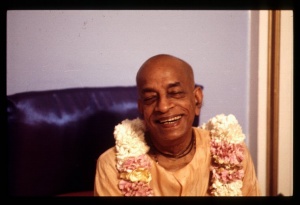SB 11.19.27

A.C. Bhaktivedanta Swami Prabhupada
TEXT 27
dharmo mad-bhakti-kṛt prokto
jñānaṁ caikātmya-darśanam
guṇesv asaṅgo vairāgyam
aiśvaryaṁ cāṇimādayaḥ
SYNONYMS
dharmaḥ—religion; mat—My; bhakti—devotional service; kṛt—producing; proktaḥ—it is declared; jñānam—knowledge; ca—also; aikātmya—the presence of the Supreme Soul; darśanam—seeing; guṇeṣu—in the objects of sense gratification; asaṅgaḥ—having no interest; vairāgyam—detachment; aiśvaryam—opulence; ca—also; aṇimā—the mystic perfection called aṇimā; ādayaḥ-and so forth.
TRANSLATION
Actual religious principles are stated to be those that lead one to My devotional service. Real knowledge is the awareness that reveals My all-pervading presence. Detachment is complete disinterest in the objects of material sense gratification, and opulence is the eight mystic perfection, such as aṇimā-siddhi.
PURPORT
The Supreme Lord is perfect knowledge; thus one who has been delivered from ignorance automatically engages in the devotional service of the Lord and is called religious. One who becomes detached from the three modes of material nature and the gratificatory objects they produce is considered to be situated in detachment. The eight mystic yoga perfections, described previously by the Lord to Uddhava, constitute material power, or opulence, in the highest degree.